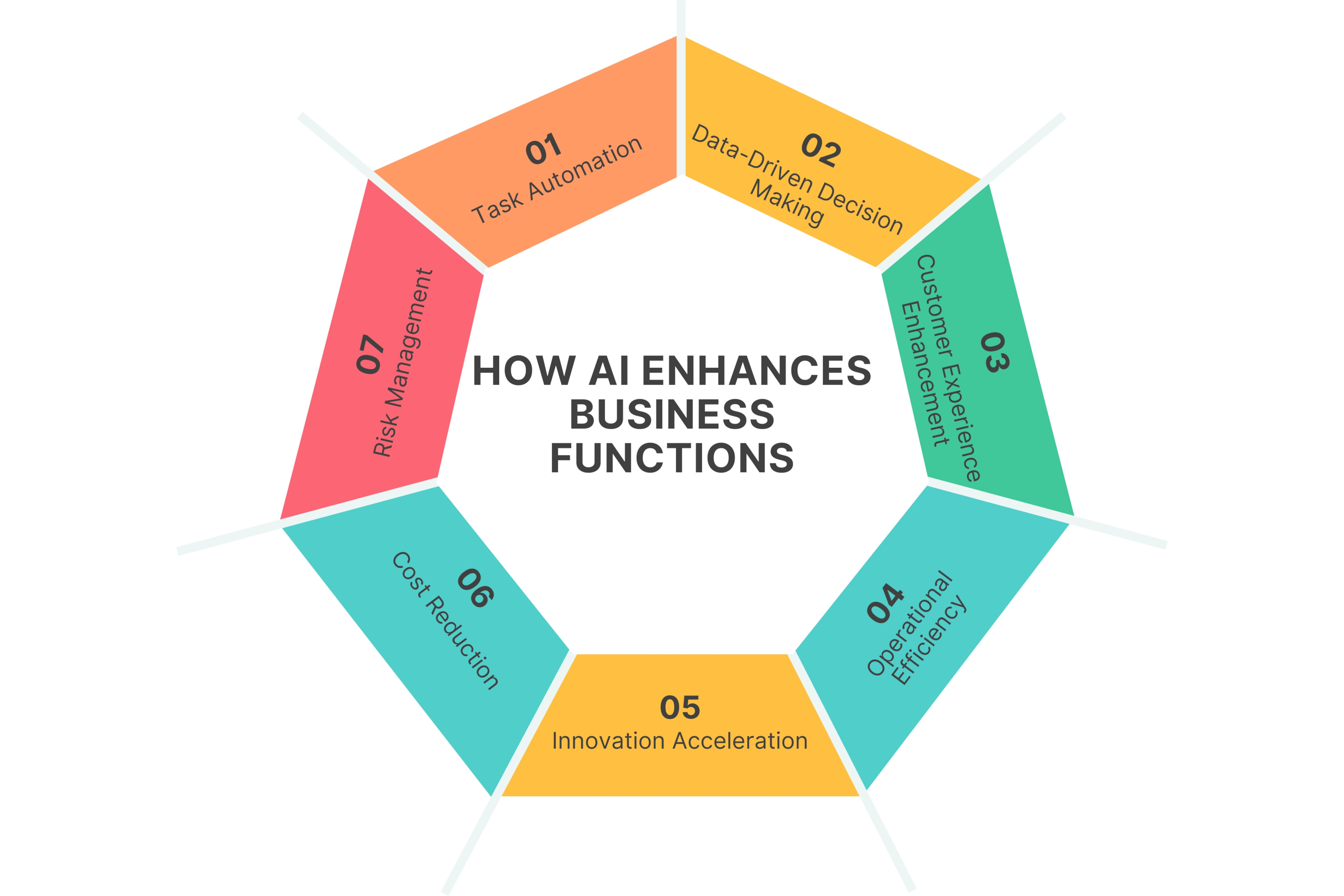May 21, 2025
How AI is Reshaping U.S. Businesses: Key Trends and Insights
Explore how AI is reshaping business strategies and operations, driving efficiency while posing new challenges. Read more to stay informed and adapt.
In 2024, 72% of companies reported using AI in at least one business function, up from 55% in 2023. AI adoption varies by industry; 18% of information sector businesses and 12% of professional services firms currently utilize AI, while agriculture and construction sectors have adoption rates of 1% each. 91% of small businesses using AI believe it will drive future growth.
However, only 5% of U.S. businesses extensively incorporate AI into their operations, indicating significant growth potential. AI's impact spans various sectors, from enhancing customer experiences to streamlining operations, positioning it as a critical driver of innovation and efficiency in the modern business landscape.
This blog will explore key trends, industry-specific impacts, and the future of AI in U.S. businesses, offering valuable insights on how AI can reshape your company’s operations.
6 Key Takeaways You Should Know

- AI is transforming business operations by automating tasks, enhancing decision-making, and improving customer experiences.
- AI adoption across industries is driving significant productivity gains, especially in sectors like healthcare, finance, and retail.
- Businesses can leverage AI-powered tools for cost savings, including automating repetitive tasks and optimizing resource management.
- Predictive analytics and AI help businesses forecast trends, manage risks, and make data-driven decisions.
- Small businesses can start by integrating affordable AI tools to streamline operations and gain a competitive edge.
- The future of AI in business includes advanced personalization, enhanced efficiency, and broader automation.
The Impact of Artificial Intelligence on Business
AI-driven innovation is transforming business operations across industries, not just by automating tasks but by enhancing efficiency, decision-making, and customer experiences. AI is allowing companies to unlock new opportunities for growth and competitive advantage.
Here are some key statistics highlighting AI’s growing role in business:
- 72% of business leaders believe AI will be a key driver of business growth by 2025.
- 77% of companies are either using or exploring the use of AI in their operations.
- 83% of companies consider AI a top priority in their business strategies.
- AI adoption could increase labor productivity growth by 1.5 percentage points annually over the next decade.
- Generative AI is estimated to add between $5 billion and $15 billion to the global marketing industry's productivity.
- 56% of businesses use AI to enhance and streamline their operations.
- 51% of companies utilize AI for cybersecurity and fraud management.
- 47% of businesses employ AI tools like digital personal assistants to improve operational efficiency.
- 46% of companies apply AI in customer relationship management, enhancing engagement.
- 40% of businesses rely on AI for inventory management, optimizing supply chains.
These statistics emphasize how AI is fundamentally changing how businesses operate, driving productivity, cost savings, and enhancing decision-making. The adoption of AI tools across various business functions is poised to accelerate, offering immense potential for companies to enhance efficiency and gain a competitive edge in the marketplace.
AI’s Impact Across U.S. Industries

Impact on Medical Industry
AI in healthcare is projected to grow at CAGR of 38.5% from 2024 to 2030, with applications in diagnosis, treatment plans, and personalized care.
AI is changing healthcare by enabling more accurate diagnoses, optimizing treatment plans, and personalizing patient care. AI-powered tools analyze medical images, predict health risks, and support doctors in making better decisions. It also streamlines administrative tasks, reducing costs and improving patient outcomes.
Impact on Mining Industry
AI adoption in mining is expected to lead to a 30% reduction in operational costs by 2025.
In the mining sector, AI is improving safety by monitoring real-time data from machinery and workers. It helps predict equipment failure before it happens and optimizes the scheduling of mining operations. AI-driven automation reduces human error, enhances productivity, and helps manage resource extraction more efficiently.
Impact on Banking Industry
AI in banking could save the industry $447 billion by 2023 through automation of tasks like fraud detection and customer service.
AI is transforming the banking industry by automating routine tasks such as fraud detection and customer service. AI tools analyze transaction patterns to prevent fraud and optimize customer support with chatbots and virtual assistants. These applications enhance the customer experience while lowering operational costs.
Impact on Accounting Industry
The AI in Accounting market is projected to reach $6.68 billion by 2025, growing at a compound annual growth rate (CAGR) of 41.27% to $37.60 billion by 2030.
AI is revolutionizing accounting by automating routine tasks, enhancing data accuracy, and providing real-time financial insights. Professionals are leveraging AI for tasks such as composing emails (59%), automating workflows (36%), and conducting research (31%). This integration leads to improved work quality, data accuracy, and cost reductions, positioning AI as a pivotal tool in modern accounting practices.
Impact on Construction Industry
The AI in construction market is projected to grow from approximately $3.99 billion in 2024 to $11.85 billion by 2029, reflecting a compound annual growth rate (CAGR) of 24.31%.
In the construction industry, AI enhances project planning, resource allocation, and task management, leading to reduced timelines and costs. AI-powered solutions also improve safety by monitoring real-time data, detecting hazards, and ensuring compliance with regulations. Additionally, AI facilitates quality control and defect detection, ensuring high construction standards and reducing rework.
Environmental Impact of AI
AI-powered energy efficiency systems in buildings could reduce global energy consumption by 10% by 2035.
AI is playing a significant role in improving energy efficiency in buildings. AI-powered systems optimize heating, ventilation, and air conditioning (HVAC) systems, reducing energy consumption. By using data to predict energy usage patterns, AI helps businesses and households reduce waste and lower their environmental impact.
Economic Impacts of AI
AI could contribute up to $15.7 trillion to the global economy by 2030.
AI is a key driver of economic growth, contributing to job creation and new business opportunities. As AI systems become more integrated into various industries, they are fostering innovation, improving productivity, and opening up new avenues for revenue generation. The overall economic impact of AI will be felt across sectors, boosting GDP globally.
These statistics demonstrate the transformative power of AI across industries, from healthcare to construction, and its potential to drive efficiency, innovation, and economic growth. AI is reshaping business operations, creating opportunities for cost savings, improved safety, and better decision-making.
If you’re targeting global markets, explore how AI helps scale content in multiple languages in this guide on multilingual SaaS marketing.
How AI Enhances Business Functions
AI is transforming business operations across all industries, optimizing processes and driving innovation. From automating routine tasks to enhancing decision-making, AI's ability to streamline business functions is becoming essential for growth and efficiency. Let's explore how AI enhances key business functions:

Task Automation
AI plays a crucial role in automating repetitive tasks across various business functions. Tasks like data entry, inventory management, and customer inquiries can be handled quickly and efficiently by AI systems, allowing employees to focus on more strategic activities.
By automating these mundane tasks, businesses can save time, reduce human error, and enhance productivity. AI tools ensure accuracy and consistency, which helps businesses improve their operational workflows.
Data-Driven Decision Making
AI helps businesses harness the power of vast amounts of data. With advanced algorithms, AI systems analyze data in real-time, providing businesses with actionable insights to drive smarter decisions.
These insights allow companies to identify trends, forecast future outcomes, and make data-driven decisions that improve performance. By using AI for data analysis, businesses can minimize risks, capitalize on opportunities, and create more effective strategies.
Customer Experience Enhancement
AI has revolutionized customer service through tools like chatbots and virtual assistants. These AI-powered tools offer immediate, 24/7 responses to customer inquiries, improving accessibility and response time.
AI also uses predictive analytics to anticipate customer needs, offering personalized recommendations and solutions. By enhancing customer interactions, AI improves satisfaction, increases loyalty, and builds stronger customer relationships.
Operational Efficiency
AI helps businesses streamline their operations by automating tasks and optimizing processes. From supply chain management to inventory tracking, AI helps reduce errors, eliminate inefficiencies, and improve time management. AI algorithms can analyze workflows and suggest improvements, making it easier to allocate resources and ensure smooth operations. The result is enhanced efficiency, reduced operational costs, and improved productivity across departments.
Innovation Acceleration
AI plays a pivotal role in driving innovation. It enables businesses to speed up product development and research by automating parts of the R&D process, reducing the time needed to bring new products to market.
AI also helps identify new market opportunities, optimize designs, and test new concepts quickly. By integrating AI into innovation efforts, businesses can stay ahead of competitors and deliver cutting-edge solutions to their customers.
Cost Reduction
AI contributes to cost reduction in several areas of business. By automating repetitive tasks, businesses can reduce the need for manual labor, cutting down on labor costs. AI-powered marketing tools help optimize ad spending by targeting the right audiences, ensuring a higher return on investment (ROI). Additionally, AI can streamline maintenance operations, reducing the need for costly repairs by predicting issues before they occur.
Risk Management
AI's predictive analytics capabilities help businesses identify potential risks before they become significant problems. By analyzing data patterns and trends, AI systems can forecast market fluctuations, supply chain disruptions, or even financial uncertainties.
This allows businesses to take proactive measures and mitigate risks, ensuring more secure operations and informed decision-making. Short-form AI-generated videos can supercharge your SaaS product marketing by turning feature highlights into compelling visuals.
Where Exactly AI Supports Your Business Needs
AI is becoming an indispensable tool in the business world, offering support in various critical areas. From streamlining operations to providing actionable insights, AI-powered solutions enable businesses to optimize their processes, improve customer experiences, and gain a competitive advantage. Here's how AI is specifically supporting business needs:

Market Research
AI helps businesses gather data-driven insights into consumer behavior, market trends, and customer preferences. By using machine learning algorithms and data analytics, AI systems analyze vast amounts of consumer data to identify key trends and predict future shifts in the market.
Stat: 90% of businesses use AI for market research to identify customer trends.
These insights empower business leaders to make informed decisions that align with changing consumer demands. AI tools can process historical data and provide actionable insights that guide marketing strategies, ensuring businesses remain competitive and relevant.
Operational Efficiency
AI plays a pivotal role in enhancing operational efficiency. It automates time-consuming tasks such as data entry, inventory management, and routine business processes, significantly reducing manual labor.
Stat: AI-powered systems can reduce processing errors by up to 41% in key business functions.
With deep learning and neural networks, AI systems can identify inefficiencies, streamline workflows, and minimize errors. This results in smoother operations, better resource allocation, and cost savings. Business artificial intelligence tools allow businesses to focus on more strategic activities while AI handles repetitive tasks.
Customer/Employee Relationship Enhancement
AI enhances relationships with both customers and employees by enabling personalized marketing strategies and improved support systems. Through predictive analytics and natural language processing, AI tools analyze consumer behavior and historical data to offer personalized recommendations, targeted marketing campaigns, and real-time customer support.
Stat: AI-driven personalized marketing can improve ROI by up to 30%.
AI chatbots and virtual assistants handle customer inquiries efficiently, enhancing customer satisfaction while reducing wait times. Additionally, AI fosters stronger employee relationships by automating routine tasks, allowing human workers to focus on more complex, value-added activities.
AI is fundamentally changing how businesses operate and engage with customers, making it easier to automate tasks, gather valuable insights, and provide personalized experiences. By leveraging AI technology, companies can stay ahead in the AI era, offering better products, services, and experiences to their customers while maintaining a competitive edge in the business world.
Reels can support user onboarding and feature education—two key parts of SaaS product development.
Challenges and Ethical Considerations for Implementing AI in Business
While AI presents numerous benefits for businesses, its implementation comes with challenges and ethical considerations. Addressing these concerns is crucial for successful AI integration.

Ethical and Privacy Concerns
As AI continues to evolve, businesses must navigate concerns related to data privacy and AI bias. The use of customer data for training AI systems raises questions about how this data is collected, stored, and protected. There is also the risk of algorithmic bias, where AI systems may produce unfair or discriminatory results due to biased training data.
Businesses must ensure that their AI systems comply with data privacy regulations like GDPR and maintain transparency in their data management practices. Ethical AI usage is crucial in gaining customer trust and fostering long-term relationships in the AI era.
Skill Gaps and Workforce Transformation
AI's rapid advancement necessitates significant changes in the workforce. Many employees will need to develop new skills to work alongside AI tools effectively. This requires a focus on upskilling and continuous learning.
Businesses must invest in training programs to teach employees how to collaborate with AI technologies, ensuring that they can leverage machine learning and predictive analytics to enhance their roles. The transformation of the workforce involves fostering an environment where employees can embrace AI-powered tools to complement their abilities, rather than replace them.
Integration and Compatibility Issues
Integrating AI into existing business systems presents significant challenges. Many businesses rely on legacy systems that may not be compatible with new AI technologies. Ensuring smooth integration requires businesses to invest in modern AI tools that can communicate with current systems, without disrupting day-to-day operations.
Compatibility issues can lead to delays, increased costs, and operational inefficiencies. Furthermore, businesses must ensure that their AI technology can scale with growing data and evolving market demands, while still integrating with existing processes like inventory management and customer relationship management. Short-form AI-generated videos can supercharge your SaaS product marketing by turning feature highlights into compelling visuals.
What is the Future of AI in Businesses?
AI is rapidly evolving, and its future in business is filled with immense potential. As AI-powered tools continue to advance, businesses will experience enhanced efficiency, better decision-making, and a more personalized approach to customer interactions. Here’s what the future holds for AI in businesses:

Increasingly Human-Like Language Generation
Generative AI tools are revolutionizing content creation by enabling machines to produce human-like language. These tools use machine learning algorithms to generate code for content, whether for social media posts, marketing campaigns, or customer support.
The ability of AI to simulate human intelligence in writing and interacting with customers will enhance communication across platforms. It will enable businesses to engage customers with more dynamic, relevant, and contextually aware content.
Enhanced Personalization
In the future, AI will play a pivotal role in personalized marketing strategies. AI systems will be able to analyze vast amounts of data and provide more accurate insights into customer behavior, preferences, and needs.
Generative AI will be crucial in creating customized marketing campaigns that resonate with individual customers. As businesses gain deeper insights into their customers, they will be able to tailor experiences in real time, driving customer satisfaction and improving marketing ROI.
Microtargeting via Granular Audience Segmentation
AI will enable businesses to microtarget audiences with precision through granular audience segmentation. By analyzing publicly available data and customer data, AI will allow businesses to identify niche groups and create hyper-targeted campaigns.
This level of segmentation will help companies enhance their competitive advantage, improving the effectiveness of their marketing efforts and ultimately driving significant productivity gains. For small businesses, this level of targeting will allow them to compete with larger companies by focusing on specific market segments that offer the most value.
Highly Accurate Predictive Analytics
AI will improve predictive analytics capabilities, allowing businesses to forecast future trends and outcomes with high accuracy. By analyzing historical and real-time data, AI will enable companies to predict shifts in market trends, customer behavior, and future trends.
This will empower businesses to make data-driven decisions and stay ahead of the competition. For healthcare providers, AI will provide accurate risk management insights, helping anticipate future health trends and prepare for challenges in the medical field.
AI-Powered Tools for Increased Efficiency
The future of AI will see it playing an even larger role in automating time-consuming tasks and optimizing business processes. Machine learning algorithms will allow businesses to automate routine tasks, freeing up employees to focus on more strategic initiatives.
In sectors such as retail, AI will streamline operations, improve inventory management, and ensure better customer engagement through AI-powered tools. This efficiency will result in improved business analytics, allowing businesses to make faster, more informed decisions. By implementing AI, companies will not only improve internal processes but also enhance customer experiences, creating smoother, more efficient workflows across industries.
The future of AI in businesses promises to bring enhanced personalization, greater efficiency, and data-driven decision-making, making it a critical tool for success. As AI continues to evolve, businesses that leverage these technologies will be better positioned to stay competitive and meet the ever-changing demands of the market. If you’re targeting global markets, explore how AI helps scale content in multiple languages in this guide on multilingual SaaS marketing.
Conclusion
AI is reshaping the way businesses operate, offering enhanced efficiency, smarter decision-making, and more personalized customer experiences. As AI continues to evolve, its impact on industries will only grow, driving innovation and creating significant competitive advantages.
From automating tasks to improving predictive analytics, AI tools are crucial for businesses to stay ahead in an increasingly data-driven world. If you're ready to leverage AI for your business, Unscript offers cutting-edge AI tools to automate content creation, enhance marketing efforts, and drive engagement. Book a demo today to see how Unscript can help you unlock your business’s potential with AI.
FAQ
How can AI help businesses save costs?
AI helps businesses save costs by automating repetitive tasks, reducing human labor, and improving operational efficiency. It also helps optimize inventory management, streamline customer service, and identify cost-saving opportunities in various processes.
What are the risks associated with AI in business?
The main risks include data privacy concerns, AI bias, and the potential for job displacement. There are also integration challenges and the need for constant monitoring to ensure AI systems are functioning ethically and securely.
How does AI improve customer experience?
AI improves customer experience by providing personalized recommendations, handling customer inquiries with chatbots, and offering 24/7 support. AI can anticipate customer needs using predictive analytics, enhancing satisfaction and loyalty.
What industries are most impacted by AI in the U.S.?
AI is most impactful in healthcare, finance, retail, and manufacturing. These sectors use AI for tasks such as data analysis, predictive maintenance, and customer engagement, transforming operations and increasing efficiency.
What is the future of AI in business?
The future of AI in business includes enhanced personalization, predictive analytics, and automation across industries. AI will continue to improve decision-making, drive innovation, and provide businesses with a competitive advantage.
How can small businesses integrate AI into their operations?
Small businesses can integrate AI by using affordable AI tools for automating marketing, improving customer service, and streamlining inventory management. Starting with AI-powered tools for specific tasks allows small businesses to enhance efficiency without heavy upfront investment.















.png)





















.svg)
.svg)
%201.svg)

.webp)
.webp)





.svg)
